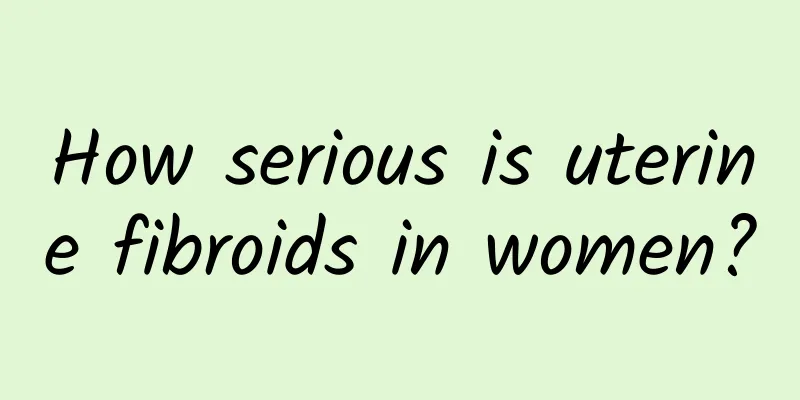How serious is uterine fibroids in women?

|
Uterine fibroids are a common problem that threatens women's reproductive health, and uterine fibroids may have the potential to be malignant. Uterine fibroids that are larger than five centimeters in size must be taken seriously, and the doctor's treatment advice must be actively followed to avoid malignant changes. 1. Generally, once uterine fibroids are found, if they are less than 5CM, doctors will recommend not treating them first, or consider using medication to control them and observe them regularly. in the case of If the uterine fibroids are larger than 5CM and the symptoms are severe, we can consider using medication combined with physical therapy. If the growth rate of uterine fibroids is relatively fast, then timely treatment is needed, otherwise if it is allowed to grow, it may become cancerous. 2. In fact , the size, location, and symptoms of uterine fibroids will affect the severity of the fibroids. Some very small uterine fibroids also require surgery if they grow in a bad position. For example, uterine fibroids that grow under the mucosa are sometimes only one or two centimeters, or even 0.5 centimeters, and they all need surgery first because they will cause a lot of bleeding under the mucosa. 3. Due to uterine fibroids, patients have heavy menstrual flow and long menstrual periods. Long-term excessive menstrual blood loss can lead to secondary anemia and even anemic heart disease. In severe cases, symptoms such as general fatigue, pale complexion, shortness of breath, and palpitations may occur. It is more common in submucosal uterine fibroids and intramural uterine fibroids. In this case, it cannot be delayed arbitrarily. It is recommended that surgery be performed at the right time, which is an effective treatment method. Otherwise, it may be life-threatening. 4. Fibroids compress pelvic organs and cause corresponding symptoms : such as compression of the bladder causing urgency, frequency, or even difficulty urinating; compression of the rectum causing rectal irritation symptoms or even difficulty defecation; low-lying fibroids or cervical fibroids or broad ligament fibroids compressing the ureter causing hydrops in the ureter and renal pelvis. People who experience symptoms of pelvic organ compression do not necessarily also have heavy menstrual flow or prolonged menstruation. Generally speaking, surgical treatment should be considered once cervical fibroids, broad ligament fibroids, and submucosal fibroids are discovered. |
<<: What is the best way to treat norovirus?
>>: What are the symptoms of norovirus infection?
Recommend
What are the symptoms and manifestations of hernia in women?
Hernia disease has no gender differences. Women a...
The effect of chest lymphatic detoxification in traditional Chinese medicine
I believe that everyone often feels some discomfo...
Why does my right eye twitch? Right eye twitching sign
As the saying goes, the left eye twitching brings...
What are the indicators of leukemia blood routine? It turns out to be like this
Leukemia is a common disease these days, and it i...
What happens if you eat too much licorice tablets?
Licorice tablets are relatively safe and have rel...
Why are my arms and legs numb?
In our daily life, we often encounter the phenome...
What causes stomachache when angry?
Many people are troubled by stomachache when they...
Five common methods of promoting blood circulation and removing blood stasis are taught to you
Generally speaking, older people are more prone t...
Can chronic gastritis drink yogurt?
The increasingly fast pace of life has brought co...
How to heal quickly after a knife cut
In the hot summer, many people suffer from "...
What can you eat to clear your lungs and reduce phlegm? Three recipes you can choose regularly
Clearing the lungs and reducing phlegm is somethi...
The easiest way to cure hoarseness
Hoarseness is quite common in life. For example, ...
How to eat saffron
Saffron, also known as saffron, is a traditional ...
What to do if the vagina is inflamed
It is common for men to have inflammation of the ...
Reasons for low milk supply after a cold
For breastfeeding women, when they have a cold, t...









